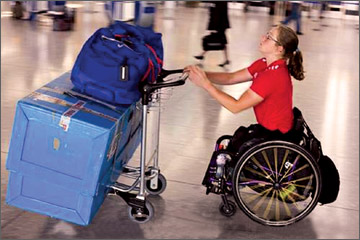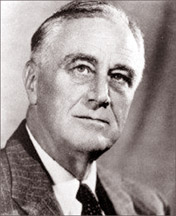Air travel and disabled
Dr Ruwantissa Abeyratne
In November 2008, the Federal Court of Appeal of Canada handed down
its decision against Air Canada that it and other carriers do not have
the right to charge disabled or obese people for an extra ticket when
they need an additional seat or an attendant to accompany them. The
Court refused to hear an appeal from the airline and rejected a Canadian
Transportation Agency ruling that the applicant had to satisfy the
Agency both that she was disabled by reason of her obesity and that she
had encountered an undue obstacle in air travel.
|

Making air travel more comfortable for the disabled. Picture
courtesy: Google |
The majority of the three-member panel dismissed the application on
the preliminary ground that the applicant did not satisfy the first
condition.
This ruling, although seemingly isolated, brings to bear the need to
revisit the subject of the rights of a disabled passenger in the context
of global principles as well as regional and national laws with a view
to harmonizing them, primarily by incorporating global principles in
national legislation.
This article discusses global principles as well as regulations
applicable in Europe and the United States and inquires as to how
domestic jurisdictions should be guided in interpreting global rules
within their internal rules and procedures.
Medical evidence
In order to obtain the remedy which she was seeking, the applicant,
who was morbidly obese and attributed her obesity to a condition known
as the Stein-Leventhal syndrome, had to show that although no medical
evidence establishes the cause of her obesity it was not disputed that
her morbidly obese condition had been medically established.
She therefore had to satisfy the Agency both that she was disabled by
reason of her obesity and that she had encountered an undue obstacle in
air travel.
The majority of the three-member panel dismissed the application on
the preliminary ground that the applicant did not satisfy the first
condition.
The applicant appealed against a finding of the Canadian
Transportation Agency which dismissed the applicant’s complaint. The
majority concluded that the applicant inappropriately relied on
inapplicable criteria to establish her disability.
The Agency equated the limitation encountered by the applicant to an
obstacle and held that considering the obstacle in determining the
applicant’s disability was inconsistent with the scheme of the CTA. The
majority went on to find that the applicant’s obesity did not constitute
a disability for the purposes of Part V of the CTA and dismissed her
complaint on that basis.
Workplace discrimination
|

Franklin Delano Roosevelt
Former US President |
On January 14, 2003, the Federal Court of Appeal granted the
applicant leave to appeal. The Court held that a disability cannot be
determined by mere definition or in the abstract and that it should be
taken in context. The Court cited with approval a dictum of Binnie J for
a unanimous Court in a case decided in 2002 involving workplace
discrimination on account of an alleged disability.
Justice Binnie was of the view that a disability, unlike, for
example, race or colour, may entail pertinent functional limitations. An
individual may suffer severe impairments that do not prevent him or her
from earning a living. Beethoven was deaf when he composed some of his
most enduring works. Franklin Delano Roosevelt, limited to a wheel-chair
as a result of polio, was the only President of the United States to be
elected four times. Terry Fox, who lost a leg to cancer, inspired
Canadians in his effort to complete a coast-to-coast marathon even as he
raised millions of dollars for cancer research.
Professor Stephen Hawking, struck by amyotrophic lateral sclerosis
and unable to communicate without assistance, has nevertheless worked
with well-known brilliance as a theoretical physicist. (Indeed, with
perhaps bitter irony, Professor Hawking is reported to have said that
his disabilities give him more time to think.)
The fact they have steady work does not, of course, mean that these
individuals are necessarily free of discrimination in the workplace. Nor
would anyone suggest that, measured against a yardstick other than
employment (access to medical care for example), they are not persons
with daunting disabilities.
In civil aviation parlance, the disabled airline passenger is
referred to as a person with disabilities. The Convention on Civil
Aviation (Chicago Convention) recommends that when travelling, persons
with disabilities should be provided with special assistance in order to
ensure that they receive services customarily available to the general
public.
Such assistance includes the offering of information and directions
in media that can be understood by travellers with cognitive or sensory
disabilities. The operative word in the Annex is disabilities as
compared with impairment and handicap.
In 1976 the World Health Organization handed down its definitions of
the three words disabilities impairment and handicap. These definitions
brought to bear a distinct correlation between the words as flowing from
one to the other.
According to the WHO definitions an impairment is any loss or
abnormality of psychological, physiological or anatomical structure or
function; a disability is any restriction or lack (resulting from an
impairment) of ability to perform an activity in the manner or within
the range considered normal for a human being; and, a handicap is a
disadvantage for a given individual, resulting from an impairment or a
disability, that prevents the fulfilment of a role that is considered
normal (depending on age, sex and social and cultural factors) for that
individual.
Therefore, one could deduce that a passenger with disabilities in an
aircraft would have a restriction or lack (resulting from an impairment)
of ability to perform an activity in the manner or within the range
considered normal for a human being through a loss or inability and that
such persons would be handicapped.
Accordingly passengers in an aircraft in flight including those: with
ambulatory challenges; who are blind or mute; and who need support to
consume food or drink, would be considered disabled.
The European Union defines a disabled passenger as any person whose
mobility when using transport is reduced due to any physical disability
(sensory or locomotors, permanent or temporary), intellectual disability
or impairment, or any other cause of disability, or age, and whose
situation needs appropriate attention and the adaptation to his or her
particular needs of the service made available to all passengers.
Action by the United Nations
In 1975, the United Nations General Assembly adopted the Declaration
on the Rights of the Disabled Persons (Resolution 3447 XXX) which inter
alia recognized the inherent right of disabled persons to respect for
their dignity and self-reliance.
Paragraph 8 of the Declaration provides that disabled persons are
entitled to have their special needs taken into consideration at all
stages of economic and social planning.
Later, in 1976, at its 31st Session, the United Nations General
Assembly adopted a Resolution which proclaimed 1981 as the International
Year of the Disabled, identifying in paragraph (c) as one of the
objectives of the Resolution, the encouragement of study and research
projects designed to facilitate the practical participation of disabled
persons in daily life, for example by improving their access to public
buildings and transportation systems.
In 1979, at its 34th Session, the United Nations General Assembly, by
Resolution 34/154, recalling its Resolution of 1976, further resolved
that the theme of the International Year of Disabled Persons should be
expanded to “full participation and equality” to promote the realization
of the right of disabled persons to participate fully in the social life
and development of the societies they live in.
To be continued |



